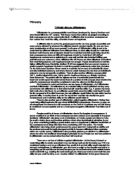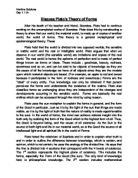Following a similar line of reasoning, I assert that human beings nowadays are no more capable of foreseeing the future than the ancient Egyptians. What they imagine about the future is all based on their present knowledge of the world, and this knowledge, scientific or otherwise, is often artistically portrayed in science fictions and movies. For instance, in Frankenstein, Mary Shelley depicts the creation of a scientific anomaly which is a combination of parts of dead bodies based on the contemporary anatomic technology. Also in the movie The Fifth Element, the world becomes truly three-dimensional, with urban traffic going not only left-and-right, back-and-forth, but up-and-down in the air at different levels as well. This fantastic idea is presumably developed from or based on the knowledge of modern human beings who have cars. However, if humans will not be using cars anymore in the future, then what will the transportation on land be? One may think of various aircrafts, absurd containers that can move, but one cannot even begin to conceive of a type of transportation that is utterly unassociated with what one has for knowledge and beliefs right now. Therefore, it is arguable that workable assumptions must at least partly be founded on empirical, verifiable knowledge; otherwise the products of human imagination may run wild and turn out to be totally irrelevant to the reality of human existence in the future.
However, the premise of my main argument is that a large part of workable assumptions is based on a priori knowledge, which is not subject to proof by investigation or experimentation. I’ll further demonstrate that human beings need such assumptions to enhance their knowledge about the world and whatever else there is to know. Good examples of this type of assumptions may be found in the five postulates of mathematics. In early 700 B.C., Euclid in his book Elements suggested five postulations, or assumptions, which cannot be proved by any other theorem, but which yet serve as the foundation of the entire system of geometry. For example, Postulate 1 states that “given any two points such as A and B, there is a line AB which has them as endpoints”[i]. This postulate seems apparent, but it is believed not to be provable. However, mathematics has been developing since the beginning of human civilization despite the fact that the five postulates are not susceptible to proof. Although they are not provable (hence not empirical), they have to be accepted as given and are thus fundamental to mathematics. Thinkers of all ages have observed and marveled at the regularity of mathematical operations and the inexorability of their results. Finally, these conclusions became basic beliefs in which mathematicians in all ages have lived through. Since modern science is anchored on mathematical knowledge, we may safely conclude that assumptions or basic beliefs based on a priori knowledge are indispensable for the construction of empirical science.
The above conclusion may seem paradoxical; yet in reality, a priori, basic assumptions and empirical knowledge complement each other. These two can be viewed as two ping-pong players who do not know any ping-pong skills at the beginning. They earn experience while watching other players playing and practicing with each other so that they develop their skills. In terms of the interplay between basic assumptions and acquired knowledge, human beings barely know anything about the world at the beginning, except for some “gut” feelings; through observations, experience, and practice, their knowledge about the world begin to take shape. Although sometimes such knowledge conflicts with what they instinctively know, the sum total of their knowledge keeps increasing and developing, thanks to the unlikely partnership of instinct and reason.
The following is an example of how reason plays its part in the process of knowledge acquisition. The process of change in assumptions and beliefs resembles that of proving a math problem. First I assume the problem is correct, and then employ applicable theorems learnt before that I believe true to seek any conflicts to prove or disprove my previous assumption. In this process, my assumptions and reasoning ability complement each other interactively and as a result, I improve my skills in the process and do not endure any discomfort of having made any wrong assumptions.
Unexceptionally, all entities possess two opposite sides, including assumptions and beliefs. What if human beings held strong but mistaken assumptions and beliefs in mythical eras? Does it mean that human society was stagnant or retrogressive? Since there are always two sides for any matter, one positive and one negative, this issue can be interpreted in the positive way. To adduce again a mathematical example, the discipline of mathematics encountered three mathematical crises which were all caused by paradoxes. In the First Mathematical Crisis of Incommensurability, the Pythagoreans, who represented the mainstream of mathematics in antiquity, strongly believed in the truth of the adage that “All is number”. They deemed all numbers to be represented by the quotient of any two integers. However, this was proved paradoxical simply by applying the Pythagorean theorem. Although the student who found this application was persecuted and died for it, the falsehood was eventually unearthed. Thus, the overthrow of the old belief did not bring catastrophe that would completely destroy the system of mathematics; on the contrary, it spurred the establishment of new theories. Hence, the abolition of faulty assumptions and beliefs signifies advancement, not necessarily retrogration, as in the process of metabolism. In terms of the fish-water analogy, the change in assumptions and beliefs for human beings bear a resemblance to the change in water, or environment, for the fish, which will not die because they are still in the water.
Fish need fresh water to maintain their lives; human beings need assumptions and basic beliefs to physically survive and, more importantly, to mentally improve themselves. We humans of modern times live in such a fast-paced world; nonetheless, while we enjoy our achievements of which we are rightfully proud, not many of us ever stop to ponder, even for a split second, what they are essentially based upon. In the process of writing this essay, I am surprised to find that a large part of human accomplishments, from antiquity all the way down to the present, should be credited to the indomitable human spirit in its relentless pursuit of knowledge and truth by observing, scrutinizing, and experiencing the world in which we live, as well as by assuming, proving or disproving the various theories proposed, the better to refine our knowledge about this splendid, beloved world.
1163 words
[i] Euclid’s Elements, Book 1, Postulate 1, [Online Available] http://aleph0.clarku.edu/~djoyce/java/elements/bookI/post1.html
This statement sounds awkward but I’m not sure how to correct it.
The auto grammar check of Microsoft Word says there is something wrong here. Is there any grammar mistake?







